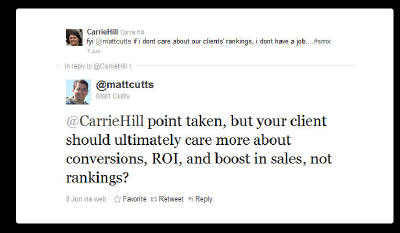Google Does Love Ranking Data – They Just Aren’t Ready To Admit It
During the Matt Cutts You & A at SMX Advanced in Seattle last week, someone asked Matt if Google would ever “like” query systems that provided ranking reports to SEOs. Matt said, again, that the focus shouldn’t be on rankings, and that website should be focused on “what makes the most money.” I rebutted that […]
During the Matt Cutts You & A at SMX Advanced in Seattle last week, someone asked Matt if Google would ever “like” query systems that provided ranking reports to SEOs. Matt said, again, that the focus shouldn’t be on rankings, and that website should be focused on “what makes the most money.”
I rebutted that stance on Twitter, stating that I thought that was a great viewpoint in theory, but as an agency SEO, if I don’t care about my clients’ organic rankings, I’m out of a job. I’d probably argue that most SEOs (in-house, agency, affiliate – whatever) also care about rankings more than Google wants them to.
Matt actually answered my tweet (that was cool!) and we talked back and forth a bit about the reality of how the world actually works versus how Google would like to tell us how to work.
Don’t get me wrong, I would love to still be in SEO the day a client comes into our agency and says, “I don’t care where I rank, or what position I am for a specific keyword, I just want to make more money.” Reality does have a hand in our day to day life though, even on the interwebz, and we need ranking information – plain and simple.
Here’s the rub: Google actually does agree that rankings are important. Webmaster Tools has reported this data for at least a year now, and the recent announcement of Google Webmaster Tools data being integrated into Google Analytics is another step in the process. Rankings are important, they’re just not ready to give in and admit it yet. Check out the following from the Google analytics blog announcement regarding the integration:
The initial release will be a set of reports in Google Analytics using search data from Google Webmaster Tools. This includes query information, clicks, impressions, clickthrough rate, and average position. You’ll also be able to use Google Analytics advanced data filtering and visualizations with this data.
Let me pull the important part of that paragraph out for you:
Average Position
I haven’t actually seen this data in my Analytics dashboards yet. You need to be sure you’re looking at the “New Version” after you’ve requested access to the pilot. Check out Barry Schwartz’ article from last week’s announcement for some screenshots.
What Can SEO’s Do With Merged Rankings & Analytics?
The waiting is the hardest part. The anticipation of having average position data for organically ranked keywords in my Google Analytics account gets my nerdy hopes up. It may be likely we’ll have to use the Advanced Data Filtering option in a Custom Report, but even with the setup of that report, this feature has the potential to save any SEO a ton of time each month.
Prior to this being available, we all took our ranking reports and manually merged them with our Google Analytics data each month. We built elaborate messes of spreadsheets that tracked fluxuations in rankings and correlated them with fluctuations in revenue.
Once I have sample data to work with, I’ll share a how-to with readers on how to integrate ecommerce data with ranking data for a given time period. I personally can’t wait to see how it looks.
Ultimately, I do see a light at the end of the tunnel with regards to the ranking versus ROI argument. There has always been a pattern to how concepts are adopted.
Think of the reaction from clients and C-suites when you started talking about reviews years ago, or needing funds for link building – they were resistant, scared, annoyed, and avoided the conversation as a whole for months and years, eventually they saw the light and turned the corner. I think the same will eventually happen with the ranking versus ROI argument.
What really needs to happen is integration of revenue tracking into every ecommerce platform. Every shopping cart, booking engine, and home grown payment application needs to support tracking scripts.
Once we can show every single website owner the realities of dollars and cents, they’ll start turning the corner to ROI over Rankings. But until then, we have to see ranking data (there’s no way around it) and Google does agree, even if they won’t say it out loud.
Contributing authors are invited to create content for Search Engine Land and are chosen for their expertise and contribution to the search community. Our contributors work under the oversight of the editorial staff and contributions are checked for quality and relevance to our readers. The opinions they express are their own.
Related stories
New on Search Engine Land
